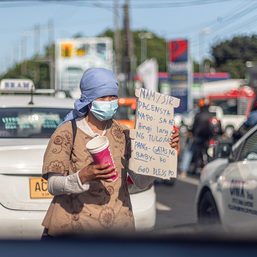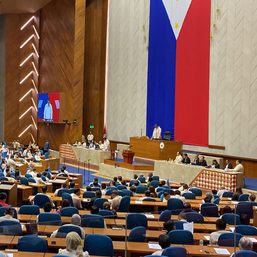SUMMARY
This is AI generated summarization, which may have errors. For context, always refer to the full article.

First of 2 parts
MANILA, Philippines – When she was barely out of 12th grade, 19-year-old Stephanie had had enough of her exhausting lifestyle as a working student.
Stephanie, who requested that her surname be withheld, had a set routine. From 11 pm to 9 am, she worked as a telemarketer for a business processing outsourcing (BPO) company in Ortigas. Not even an hour after ending her shift, she would begin her classes at 9:30 am. The only time she could get some sleep was the afternoon, until she woke up at around 6 pm to prepare for the next shift and commute from her home in Rizal.
“I also experienced doing my online classes in the jeepney. I could barely comprehend what the class was about… So it was just work, school, work, school, and then just try to get some sleep if I can,” she said.
During this endless cycle, Stephanie’s friend introduced her to a sugar dating platform. Sugar dating typically occurs between older, wealthier men and younger women, where the elder partner gives money or gifts in exchange for the younger’s companionship or other favors. Stephanie’s friend said she had tried it, and earns money from it.
“Are you sure this is safe – 100%? [Am I] not going to get murdered or anything?” Stephanie asked her friend jokingly, although somewhat serious. Assured by her friend of its safety, for as long as she took steps to protect herself, she shelved it for consideration.
At one point, Stephanie came home from work close to experiencing a mental breakdown. “I need a switch from this,” she said. That night in August 2022, she decided to sign up for the platform introduced by her friend.
Around a month later, she started to engage in conversation with men she found were nice to her. They formed “arrangements” based on companionship, as this was the only thing that Stephanie was willing to offer.
The allowances began to come in. From P14,000 a month, her income increased quadruple-fold, and Stephanie decided to leave her job. At present, with three regular arrangements, she now earns around P60,000 to P70,000 a month.
Apart from allocating savings for her own future, she is able to pay for her own tuition, her siblings’ school expenses, more food for her family, and simply the things they want – not just things bought out of pure necessity.
In September, Sugarbook, the platform Stephanie signed up for, released data on its sugar babies based in the Philippines. The platform found that the majority of its Filipino sugar babies spend their allowances on education and rent, at 30% and 24%, respectively.
This goes against the stereotypes that sugar babies may be known for – spending allowances for luxury goods and experiences – which came at only 5%.
A dictionary definition of “sugar daddy” says he is one who is “a well-to-do, usually older man who supports or spends lavishly on a mistress, girlfriend, or boyfriend.”
Sugar babies, meanwhile, are described by various online dictionaries and blogs as young ladies or men who provide companionship or favors in exchange for financial support or gifts. But the very core of being a sugar baby is being the recipient of a sugar daddy’s material offerings.
Being a sugar baby is tied to the relationship aspect, and goes beyond age. Some would say a 35-year-old paired with a 50-year-old sugar daddy is still a sugar “baby” by virtue of her being in an arrangement with an older man where the age difference and financial or material dimension defines the relationship.
Sugarbook claims to be the top sugar daddy and sugar baby dating app. Another is Seeking, formerly known as SeekingArrangement, which similarly had sugar daddy-baby dynamics, although it has since rebranded into a “luxury dating” platform, according to the Chicago Reader.
On Seeking, while sugar daddies and babies are no longer outrightly labeled, the dynamics is still very similar to the sugar setup – “successful men” have a chance to meet and date confident women with a “beautiful vision” for life.
Communities seeking a sugar relationship can be seen on social media platforms like Facebook, Reddit, and Telegram. On Facebook, sugar communities do not seem to thrive – as a quick scan of groups called “sugar daddies and sugar babies” and “Seeking Arrangement dating” have attracted users posting malicious or phishing links, or have simply gone inactive.
On Reddit, where users are hidden by anonymity, users who appear to be in sugar relationships participate in forums where they share experiences and seek advice. One popular Reddit community is “r/sugarlifestyleforum,” with over 190,000 members, although members are not limited to the Philippines.
Even a quick search in Manila on the Apple App Store of just “sugar” brings up an array of dating and friendship apps – even if they don’t explicitly market sugar dating.
A living wage?
Stephanie, now a 20-year-old freshman in college taking up tourism, is the eldest of three children in her family. While her father works as a welder in Croatia and sends around P30,000 to P40,000 monthly, it is strictly budgeted for living costs like household expenses and groceries. It allows little wiggle room for the family to enjoy a comfortable life beyond just surviving.
This is why Stephanie felt the need to step up and help her family – but all the exhaustion earned her just P10,000 as her starting salary at the BPO increased to P14,000 when she was promoted to team leader.
What Stephanie earned was barely above the minimum wage in Metro Manila, which was then around P12,540 a month.
According to Sugarbook’s data, most of the sugar babies’ highest allowances reached up to P57,700, while the next most common allowances ranged from P141,500 to P283,000.
The average monthly allowance of Filipino sugar babies is P52,000, the platform found. IBON Foundation reported in November that the living wage of a family of five in Metro Manila, where most of Sugarbook’s sugar babies are based, is P1,188 a day or around P26,000 a month.
According to Darren Chan, Sugarbook’s founder and chief executive officer based in Malaysia, the data is an indication of broader challenges faced by many in Southeast Asia.
“It speaks volumes about the socioeconomic pressures many young people are under, where basic amenities and a good education are not always within easy reach,” said Chan.
With fluctuating inflation rates, still-recovering employment rates, and high commodity prices, Sugarbook saw a 189% traffic surge in the Philippines from December 2022 to August 2023, with 80% of users sugar babies.
As of December 2023, Sugarbook is nearing 400,000 users in the Philippines, 70% of whom are sugar babies. Roughly a third, drawing from the September data, are students.
On Sugarbook, minors are not allowed on the platform, and neither are any forms of nudity or pornography. A team of around 10 content moderators from Malaysia, Singapore, Indonesia, and Taiwan, along with artificial intelligence moderating tools, oversees the platform at all times. Members also look out for each other by reporting suspicious or inappropriate behavior.
Glimpse into a sugar relationship
Sugarbook was Stephanie’s first experience with sugar dating. Although initially going into it with apprehensions about her safety, she has learned to filter out good men from the bad, and steer her arrangements into something she also enjoys.
In exchange for an allowance, Stephanie offers companionship online, by engaging in chats or video calls, and offline, by going on dates to the mall to go shopping, see a movie, or get coffee or dinner. Her three regular sugar daddies are all businessmen – a Filipino and two Americans – who are all based abroad. She is able to go on face-to-face dates when they travel to Manila.
At least a month after she began talking to her 43-year-old sugar daddy, they planned to meet in person when he visited the Philippines.
“I was kind of nervous. I hesitated. I was going back and forth. Should I really do this?” she asked herself, adding that she almost canceled a few times.
Deciding to go ahead with the date, Stephanie put on her best dress and five-inch heels to impress the man she was set to meet at the mall. But as soon as they met and he watched her walk, he asked her, “Are you okay?”
“I’m going to tell you right now, my feet are actually hurting, and I’m feeling very uncomfortable. But it’s okay, we can continue,” she told the man.
Recalling from memory, Stephanie said the man told her, “No, if we continue like this, you’re not going to have fun. And I want you to have fun. This date is not all about me.”
The man took her to a shoe store, where Stephanie chose among several options for her aching feet. She tried to look for the cheapest ones, as she did not want the man to spend too much.
“When he found out what I was doing, he was like, ‘Any price is okay. Go get what you feel like you’re going to be comfortable with,’” said Stephanie.
On the date, they also engaged in conversation, where Stephanie told him how she was nervous about starting college. He listened to her concerns and brought her to the grocery store to get stuff she needed for school.
She started with the necessities – hygiene products, basic clothes, and a few pairs of rubber shoes. But she also considered how her mother and sisters needed some things. As she started grabbing similar necessities for her mom, and school supplies and even toys for her younger sisters, the man did not complain.
“Everything I touched, even though I did not say out loud that I needed them, he seemed to tell me, ‘Just put that into the cart, it’s okay,’” she said.
That afternoon, the man had spent for Stephanie and her family more than what she had previously earned in a month – P15,000, from the shoes to the shopping spree.
The date ended as a positive experience for Stephanie – as she realized that sugar daddies can not only be generous, but also kind, considerate, and respectful. She has kept in contact with this man up until the present.
It’s easy to imagine why a sugar baby would want to be one, but what would motivate sugar parents to blow their money on someone they met online? According to Chan, there are a variety of reasons, but a yearning for companionship is one in particular.
“Sugar daddies and mommies are typically very successful people who may feel lonely due to various life circumstances and the jobs that they have. They then seek companionship and someone with whom they can share moments, experiences, and perhaps mentor, where they can take pleasure in guiding and mentoring their sugar babies, offering them career advice, life insights, or even business opportunities,” said Chan.
Chan said that because of the “straightforward” nature of sugar relationships, as Sugarbook encourages sugar partners to be honest about their needs, sugar parents can be transparent about their expectations without the “pressures and commitments” of traditional relationships.
Sugar daddies in particular are also drawn to the ego boost of having a “trophy” partner, which plays a role in elevating their status and reputation, Chan added.
In normal relationships, couples may not have the energy for their partners 100% of the time. But for Stephanie, even if she isn’t in the mood, she would at least reply to messages from her sugar daddies, as she treats her arrangements like real jobs she earns from.
Augmenting income
In October, the Philippine Statistics Authority reported around 5.6 million employed Filipinos considered themselves underemployed, which meant they wanted additional hours of work, or an additional job.
Amia, another sugar baby who asked her real name to be withheld, is a 24-year-old tech employee who augments her income with sugar dating. Like Stephanie, she too comes from an overseas Filipino worker (OFW) family, but both her parents are working abroad.
While her parents were able to provide for Amia and her siblings, Amia had grown used to being independent. In college, she sold cookies to help pay for her tuition.
“I wanted to help my family – I wanted to spoil them as well with my own income,” said Amia.
In May, her company was looking to downsize. Anticipating that she would be laid off, she began looking for other sources of income. This was when a friend introduced her to sugar dating.
Amia was not laid off after all. But even as she earned P50,000 from her work, she said that it was still not enough to cover all her bills and expenses. She still considered sugar dating as an additional source of income, and signed up for Sugarbook as well.
“I was pretty hesitant at first – whether or not I should continue this. My only apprehension was meeting rude and pushy men. But I was surprised that I was actually able to meet professional and successful businessmen instead,” she said.
“I actually make sure to establish friendship with them first… If they are making me uncomfortable, I would relay it to them,” said Amia.
Amia earns around $7,000 to $10,000 monthly from her businessmen-sugar daddies. She not only experiences being pampered and spoiled, but is even able to visit her parents in the US.
With new data on sugar parents funding basic needs of many sugar babies, it is easy to imagine many exploitative setups. While these certainly exist, it is also possible for sugar babies to establish boundaries, and assert themselves as equals. (To be concluded) – with reports from Nathaniel Vizconde/Rappler.com
NEXT: ‘My boundaries’: On receiving end of sugar dating, some Filipinas assert equality
Add a comment
How does this make you feel?

![[Two Pronged] I still love my husband, but I’m having an affair with my ex-boyfriend](https://www.rappler.com/tachyon/2024/07/tp-first-love.jpg?resize=257%2C257&crop=269px%2C0px%2C720px%2C720px)
![[DASH OF SAS] Your privilege won’t protect you](https://www.rappler.com/tachyon/2024/07/divorce-violence-against-women.jpg?resize=257%2C257&crop_strategy=attention)
![[Two Pronged] Am I losing my libido now that I’m hitting my 40s?](https://www.rappler.com/tachyon/2024/07/two-pronged-forties-libido.jpg?resize=257%2C257&crop_strategy=attention)

![[OPINION] Unpaid care work by women is a public concern](https://www.rappler.com/tachyon/2024/07/20240725-unpaid-care-work-public-concern.jpg?resize=257%2C257&crop_strategy=attention)
![[DECODED] The Philippines and Brazil have a lot in common. Online toxicity is one.](https://www.rappler.com/tachyon/2024/07/misogyny-tech-carousel-revised-decoded-july-2024.jpg?resize=257%2C257&crop_strategy=attention)


![[OPINION] Why women seek divorce](https://www.rappler.com/tachyon/2024/06/TL-women-seeking-divorce-june-14-2024.jpg?resize=257%2C257&crop_strategy=attention)





There are no comments yet. Add your comment to start the conversation.